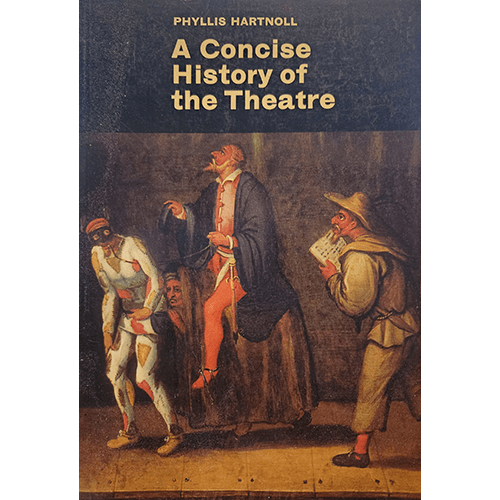Description
Author Phyllis Hartnoll
Publisher Macmillan Pub Co (January 1, 1973)
Binding Paperback
Condition Good some break in the spine and slight outlining
Summary
Phyllis Hartnoll's "A Concise History of the Theatre" (1973) offers an extensive overview of theatre's evolution from its origins to the modern era, providing insights into various traditions, significant periods, and influential figures. The book begins with ancient Greek theatre, highlighting the works of Aeschylus, Sophocles, and Euripides, the structure of Greek theatres, and the significance of festivals like Dionysia. It then explores Roman theatre's adaptation of Greek plays, contributions from Plautus and Terence, architectural advancements, and its decline. Moving to the medieval period, Hartnoll discusses the church's role in reviving theatre through liturgical plays and mystery cycles, as well as the emergence of secular performances like morality plays. The Renaissance section covers the Italian rebirth of classical ideals, commedia dell'arte, the English Renaissance with William Shakespeare and contemporaries, and Spain's Golden Age with Lope de Vega and Calderón de la Barca. The 17th and 18th centuries highlight French classical theatre's Molière, Racine, and Corneille, English Restoration theatre's revival and rise of women actors, and 18th-century innovations like sentimental comedy and Enlightenment influences.
In the 19th century, Hartnoll explores romanticism's emotional expression, the popularity of melodrama, and the shift towards realism with playwrights like Henrik Ibsen and Anton Chekhov. The 20th century covers modernist movements such as symbolism, expressionism, and absurdism with figures like Bertolt Brecht and Samuel Beckett, and post-war theatre's diversification with new playwrights like Tennessee Williams and Arthur Miller. Hartnoll concludes by reflecting on theatre's ongoing evolution, the interplay between tradition and innovation, and its global spread, emphasizing theatre's enduring relevance as a mirror to society and a powerful medium for storytelling and cultural expression.
This is an out of print edition. The 1973 edition of "A Concise History of the Theatre" by Phyllis Hartnoll is often valued for its original presentation and historical context closer to the period it covers. This edition might provide insights and perspectives reflective of scholarly interpretations of that time, which can be of interest to collectors and historians.
